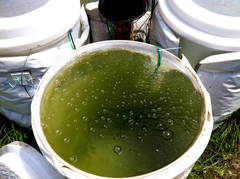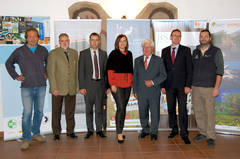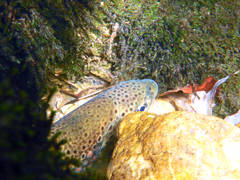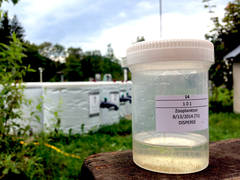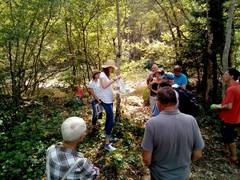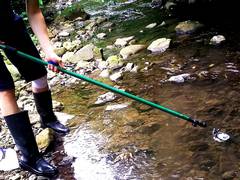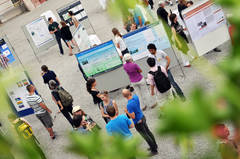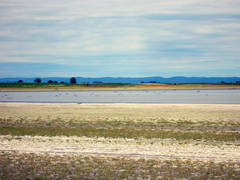The effect of temperature change on aquatic food webs is gaining increasing scientific attention. The recent IPCC report anticipated a rise in lake water temperature of up to 4°C, accompanied by a series of weather events that may cause frequent temperature fluctuations. In this study, masterstudent Paula Take investigated under supervision of Martin Kainz how increasing temperature affects the biodiversity and biochemical composition of plankton communities by conducting long-term, multi-seasonal mesocosm experiments.
On Tuesday, November 8th, took place the kick-off meeting for the project InterBird in the directorate of national park Sarród Kócsagvár. Working group leader Robert Ptacnik and WCL-researcher Zsófia Horváth talked about their activities in the course of this interregional project. In the focus of their work is the food web of soda pans from primary produciton to birds. The basic aim of the project is the cross-border coordination of activities and research of nature protection for the perpetuation of biodiverstiy.
In September started the new FWF-project „GROW“, a cooperation between working group leader Martin Kainz and Ariana Chiapella (USA), who will work at WasserCluster for one year. In this project we will investigate dietary trajectories from various food sources to fish in established mesocosm settings.
The delineation of trophic pathways in aquatic food webs is necessary for evaluating the structure and flow of energy among organisms. Understanding the importance of each energy pathway is also necessary for studying food webs in the context of anthropogenic stressors.
In the context of global change and loss of biotic diversity, understanding relationships between diversity and ecosystem functioning has become mandatory. Therefore, it is necessary to investigate underlying mechanisms that generate and maintain diversity patterns across spatial scales. Theresa Lumpi wrote her master’s thesis about this topic and finished successfully in September.
In this study we examined the effects of ecological connectivity along with important environmental parameters on freshwater microbial communities. Experimental communities were established in 40 mesocosms (300 L) inoculated with water from three lakes in Lower Austria.
More than 220 guests visited WasserCluster at the open days on 2nd and 3rd September.
On the programme there were talks about Lake Lunz trough the ages, guided tours and hands-on experiments for kids and adults as well as a mini-excursion to our outdoor constructions. It was a pleasure for us, to host so many guests!
Within the project „PowerStreams“ two master students finished their theses in the end of August under supervision of Thomas Hein and co-supervision of Gabi Weigelhofer. Felix Bauer investigated the production of greenhouse gases in context with the pollution of streams. In the focus of Katharina Leitners thesis was the context between background ammonium concentration, season and ammonium uptake/ retention ability of streams. For both theses nine streams in Lower Austria were sampled in spring and summer 2015.
Around 140 researchers from 35 countrys came to the Kartause Gaming and to WasserCluster Lunz to the 18th Meeting of the international lake observatory network GLEON, which took place for the first time in Austria. The researchers discussed the changing of lakes all over the world in times of climate change.
In July started the cross-border coordination of ecological monitoring activities in the NATURA 2000 areas Neusiedler See and Hanság. In the course of this Interreg-EU-project WCL researcher Zsófia Horváth investigates soda pans.




